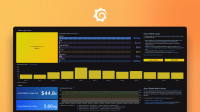Caution
Grafana Alloy is the new name for our distribution of the OTel collector. Grafana Agent has been deprecated and is in Long-Term Support (LTS) through October 31, 2025. Grafana Agent will reach an End-of-Life (EOL) on November 1, 2025. Read more about why we recommend migrating to Grafana Alloy.
Install or uninstall Grafana Agent Flow on Linux
You can install Grafana Agent Flow as a systemd service on Linux.
Install
To install Grafana Agent Flow on Linux, run the following commands in a terminal window.
Import the GPG key and add the Grafana package repository.
sudo mkdir -p /etc/apt/keyrings/ wget -q -O - https://apt.grafana.com/gpg.key | gpg --dearmor | sudo tee /etc/apt/keyrings/grafana.gpg > /dev/null echo "deb [signed-by=/etc/apt/keyrings/grafana.gpg] https://apt.grafana.com stable main" | sudo tee /etc/apt/sources.list.d/grafana.listUpdate the repositories.
sudo apt-get updateInstall Grafana Agent Flow.
sudo apt-get install grafana-agent-flow
Uninstall
To uninstall Grafana Agent Flow on Linux, run the following commands in a terminal window.
Stop the systemd service for Grafana Agent Flow.
sudo systemctl stop grafana-agent-flowUninstall Grafana Agent Flow.
sudo apt-get remove grafana-agent-flowOptional: Remove the Grafana repository.
sudo rm -i /etc/apt/sources.list.d/grafana.list




